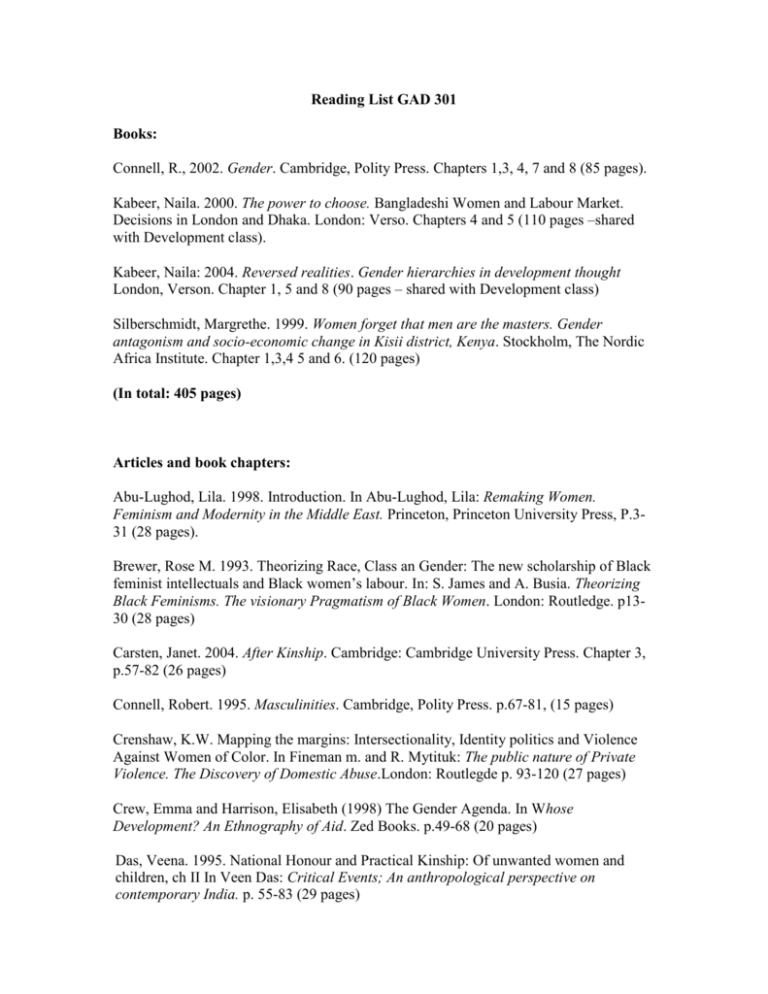
Reading List GAD 301
Books:
Connell, R., 2002. Gender. Cambridge, Polity Press. Chapters 1,3, 4, 7 and 8 (85 pages).
Kabeer, Naila. 2000. The power to choose. Bangladeshi Women and Labour Market.
Decisions in London and Dhaka. London: Verso. Chapters 4 and 5 (110 pages –shared
with Development class).
Kabeer, Naila: 2004. Reversed realities. Gender hierarchies in development thought
London, Verson. Chapter 1, 5 and 8 (90 pages – shared with Development class)
Silberschmidt, Margrethe. 1999. Women forget that men are the masters. Gender
antagonism and socio-economic change in Kisii district, Kenya. Stockholm, The Nordic
Africa Institute. Chapter 1,3,4 5 and 6. (120 pages)
(In total: 405 pages)
Articles and book chapters:
Abu-Lughod, Lila. 1998. Introduction. In Abu-Lughod, Lila: Remaking Women.
Feminism and Modernity in the Middle East. Princeton, Princeton University Press, P.331 (28 pages).
Brewer, Rose M. 1993. Theorizing Race, Class an Gender: The new scholarship of Black
feminist intellectuals and Black women’s labour. In: S. James and A. Busia. Theorizing
Black Feminisms. The visionary Pragmatism of Black Women. London: Routledge. p1330 (28 pages)
Carsten, Janet. 2004. After Kinship. Cambridge: Cambridge University Press. Chapter 3,
p.57-82 (26 pages)
Connell, Robert. 1995. Masculinities. Cambridge, Polity Press. p.67-81, (15 pages)
Crenshaw, K.W. Mapping the margins: Intersectionality, Identity politics and Violence
Against Women of Color. In Fineman m. and R. Mytituk: The public nature of Private
Violence. The Discovery of Domestic Abuse.London: Routlegde p. 93-120 (27 pages)
Crew, Emma and Harrison, Elisabeth (1998) The Gender Agenda. In Whose
Development? An Ethnography of Aid. Zed Books. p.49-68 (20 pages)
Das, Veena. 1995. National Honour and Practical Kinship: Of unwanted women and
children, ch II In Veen Das: Critical Events; An anthropological perspective on
contemporary India. p. 55-83 (29 pages)
Foucault, M. 1986. The repressive hypothesis: The Incitement to Discourse In: The
history of sexuality, Vol I. Penguin books Ltd., Middlesex, England. ch 1, p. 17-35 (20
pages)
Kabeer, Naila. 2005. Gender equality and Women’s empowerment – a critical analyses of
the third Millennium Development Goal. Gender and Development 13/1 ,p13-24 (10
pages)
Laceur, Thomas. 1990. Making sex. Cambridge: Harvard University Press, Ch. 1 p.1-24
(24 pages)
Middleton, Karen. 2000. How Karembola men become mothers. In Carsten, J. Cultures
of relatedness. Cambridge, Cambridge University Press, p 104-127 (34 pages)
Mohanty, Chandra. 1991. Introduction. Cartographies of Struggle. In C.Mohanty,A.
Rosso and L. Tourdes. Third World Women and the Politics of feminism. Bloomington:
Indiana University Press, p. 1-47 (47 pages).
Moore, Henrietta.1988. Feminism and anthropology. Cambridge: Polity Press. Chapter 2,
p12-41 (30 pages).
Moore, Henrietta. 1994. A Passion for Difference Cambridge. Polity Press, Chapter 3.
p49-70 (22 pages)
Narayan, Uma. 1997. Restoring History and Politics to “Third-World Traditions” In:
Dislocating Cultures. Identities, Traditions, and Third-World Feminism. Routledge. p.
42-80 (39 pages).
Oppong, Christine.2004. Social Capital and Systems of Care: Some Contrasting
Evidence. In K. Wærness. Dialogue on Care Volume no.16 Centre for Women’s and
Gender Research, University of Bergen. p 57-89 (23 pages)
Ortner, Sherry and Whitehead, H. 1981. Introduction. Accounting for sexual meanings. .
In: Ortner and Whitehead. Sexual Meanings. The cultural construction of Gender and
Sexuality. Cambridge, Cambridge University Press. p.1-27, (27 pages)
Oyèrónké Oyewùmí. 1999. Visualizing the Body: Western Theories and African
Subjects. In The Invention of Women. Making an African Sense of Western Gender
Discourses. University of Minesota Press. p. 1-30 (30 pages)
Pearson, Ruth. 1998. Nimble fingers revisited. Reflections on Women and Third World
Industrialization in the late twentieth century. In C. Jackson and Ruth Pearson (ed).
Feminist Visions of Development. Gender Analyses and Policy. London, Routledge.
p171-188 (18 pages)
Scheper-Hughes, N. and Lock, M. 1987, 'The mindful body: A prolegomenon to future
work in medical anthropology', Medical Anthropology Quarterly 1, p.208-225 (18
pages)
Schoepf, Brooke G. 1998. "Inscribing the body politic: women and AIDS in Africa". In:
Lock, M. and Kaufert, P.A. (eds.) 1998: Pragmatic Women and Body Politics.
Cambridge Studies in Medical Anthropology. Cambridge University Press. P.98 -125 (28
pages)
Smith, Mohga Kamal.2002. Gender, Poverty and Intergenerational Vulnerability to
HIV/AIDS. Gender and Development 10/3, p63-80 (8 pages)
Strathern, Marilyn. 1981.Self interest and the social good. Some implications of Hagen
Gender Imagery. In: Ortner and Whitehead. Sexual Meanings. The cultural contruction of
Gender and Sexuality. Cambridge, Cambridge University Press, p166-192, (27 pages)
Thapan, Meenakshi .2003. Marriage, well-being and agency among women” Gender
and Development Vol.11, No. 1 p77-84 (8 pages)
Therborn, Gøran.2004 African Families in a global context. In G. Therborn African
Families in a global context. Uppsala: Nordiska Afrikainstitutet 2004. p17-48 (30 pages)
Visvanathan, Nalini. 1997. Introduction to part 1. In: Visvanathan et.al. The Women,
Gender and Development Reader. (p 17-32 (17 pages)
Yanagisako Sylvia Junko and Collier, Jane Fishburne.1987. Toward a Unified Analysis
of Gender and Kinship. In Collier, Jane Fishburne and Yanagisako Sylvia Junko (ed.)
Gender and Kinship. Essays Toward a Unified Analysis. Stanford University Press. p. 1450 (37 pages)
(in total ca. 600 pages)







